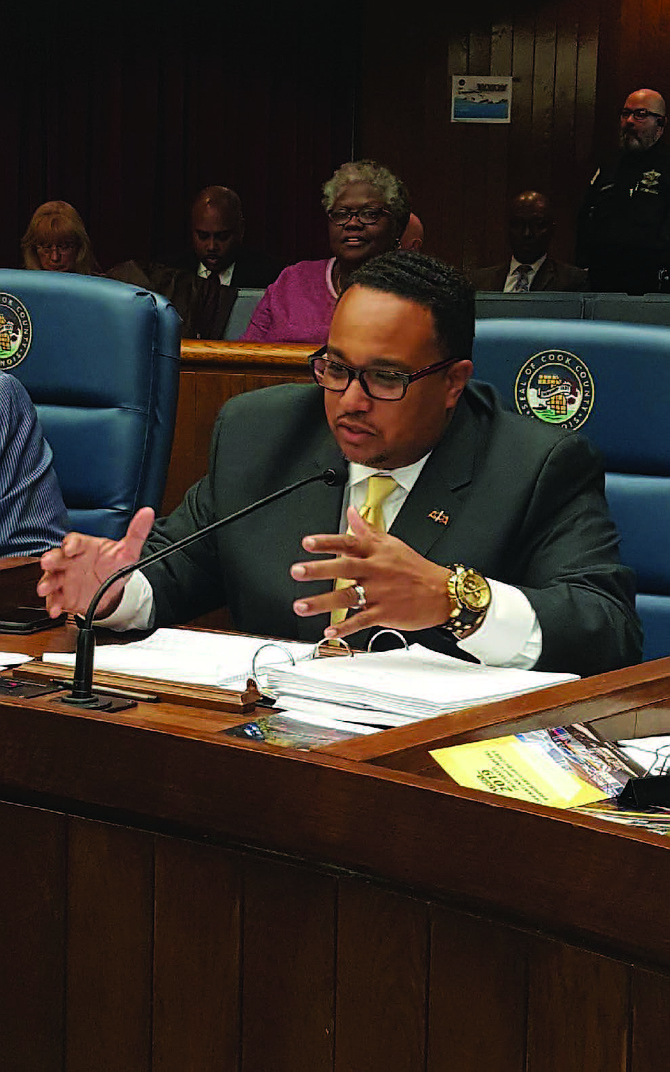MOORE SAYS DELAY THE VOTE BEFORE CHANGING THE NAME FROM COLUMBUS DAY TO INDIGENOUS PEOPLES’ DAY
Cook County Commissioner Stanley Moore wants the Cook County Board to hold off on a vote to
rename Columbus Day Indigenous Peoples’ Day until the Five Tribes acknowledge their part in the
enslavement of Africans and denial of those descendants of Freedmen membership to tribes. Photo
provided by Stanley Moore
Moore said as a student of history and someone who researched his own history, he found out that in his family, an ancestor was stolen from Angola in Africa, sold into slavery in Richmond, Virginia and was a slave in Oklahoma, enslaved by the Choctaw Indians.
“My great grandfather’s name was Albert Trotter and he was a Freedmen,” Moore said, adding that years ago, his cousin, former Senator Donnie Trotter, signed up with the Choctaw Nation.
Moore said when he tried to sign up with the Choctaw Nation years later, he was not able to sign up. Moore said as he started to do more research, he found out the Indigenous people started not to acknowledge Freedmen, those Africans who were enslaved by Indigenous People as citizens.
“If you’re a Black man born on a Reservation, you’re an Indian. And, our people were born on these Reservations,” he said, adding that when Indigenous people started to receive benefits – casinos, education reimbursement and housing, they stopped acknowledging the slaves and those descendants, but still include those descendants in census data. “How can you in good conscience use our population to get money from the federal government and in turn, not allow us to benefit from those very dollars you are getting from the federal government, based on our population.”
Moore said he is not saying what Indigenous people in the United States experienced was not horrific, nor is he saying they are undeserving of a holiday. He said that he believes he cannot support a group that is still discriminating against the descendants of Freedmen, some of whom still live on Reservation land.
“Cook County and no other body of government should vote to give them a holiday until they agree to the terms of the Treaty of 1866,” he said.
The Treaty of 1866 mandated emancipation and enfranchisement of the Black slaves of each of the Five Tribes. The Cherokee, Creek and Seminole treaties provides Freedman with unqualified rights.
Moore said the Choctaw Nation can rectify this situation and gave the example of the Cherokee Nation. On May 12, Secretary of Interior Deb Haaland approved a new Constitution for the Cherokee Nation that ensures the protection of political rights and citizenship of all Cherokee citizens, which includes the Cherokee Freedman.
Moore said his original request was to delay the vote, but if Commissioner Brandon Johnson called it to a vote, he is asking for a “no” vote.
“I think we should start to pull back the veil over the history of the Indigenous People. Everyone is saying we need to tell the truth about what Columbus did and how Columbus was a slave owner, and how he mistreated his slaves, but the Indians were slave owners, too. If we’re going to tell the truth, we need to tell the truth about both groups. You can’t pick and choose who you want to tell the truth about,” he said.
In an open letter from Choctaw Nation Chief Gary Batton, published on May 27, Batton announced the launch of an initiative to consider tribal membership for Choctaw Freedman. He stated that changing the membership requirements would require a Constitutional amendment, which would require a vote from tribal members.
“This initiative will engage Choctaw Freedmen, the Department of Interior, existing tribal members, our elected officials and membership department officials, and other Choctaw proud in listening sessions to present findings and a recommendation to Choctaw elected officials,” Batton wrote. “The story of Choctaw Freedmen deserves our attention and thoughtful consideration within the framework of tribal self-governance.”
Latest Stories
- ISBE and Lurie Children’s Launch Free, Data-Informed Resilience-Supportive Schools Illinois Initiative to Strengthen Student Mental Health and Resilience in All Schools
- Alzheimer’s Association Illinois Chapter Strengthens Commitment to Health Equity Through Diversity and Inclusion Initiatives
- Actress Draws From Life Experiences For Music And Acting Preparation
- Former Journalist’s Fragrance Company Promotes Self Care
- Doctors Provide Information About Resources For Women Experiencing Menopause
Latest Podcast
STARR Community Services International, Inc.

